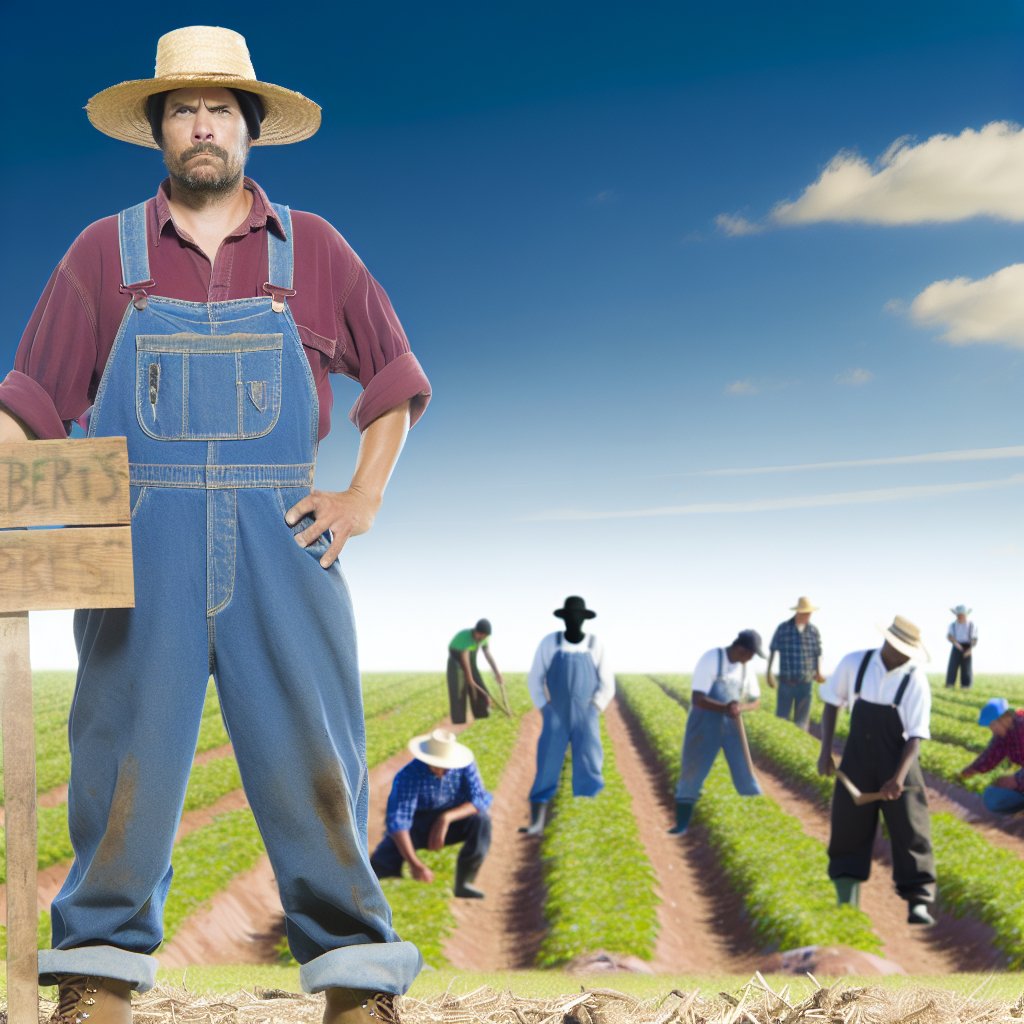Introduction to Food Waste and Its Impact on Local Farmers
Food waste is a significant issue affecting communities worldwide.
It occurs at various stages, including production, processing, and consumption.
For local farmers, food waste represents not only lost revenue but also increased production costs.
When produce is discarded, farmers struggle to maintain profitability.
Moreover, food waste contributes to environmental degradation.
Landfills filled with organic waste produce harmful greenhouse gases.
Consequently, this exacerbates climate change, impacting agricultural productivity.
Economic Challenges for Farmers
Farmers face numerous economic pressures due to food waste.
Lost crops directly affect their income and livelihoods.
When unsold produce goes to waste, it represents a sunk cost for farmers.
This often forces them to increase prices to cover losses.
Additionally, wasted food results in higher prices for consumers.
As a result, local farmers find it challenging to compete in the market.
Environmental Consequences
Food waste has severe environmental implications.
When organic waste decomposes in landfills, it emits methane gas.
Transform Your Agribusiness
Unlock your farm's potential with expert advice tailored to your needs. Get actionable steps that drive real results.
Get StartedMethane is a potent greenhouse gas that contributes to climate change.
Moreover, food waste squanders valuable resources used in production.
These resources include water, land, and energy.
By reducing food waste, we can conserve these essential resources.
Social Implications
The social impacts of food waste affect communities at large.
Food insecurity increases when surplus food is wasted.
Meanwhile, local farmers miss potential opportunities to support those in need.
In addition, waste devalues the hard work of farmers.
Farmers rely on community support for their businesses to thrive.
Tackling food waste can strengthen community ties.
Overview of Current Food Waste Statistics and Trends
Global Food Waste Trends
Food waste is a significant global issue affecting all continents.
Each year, approximately one-third of food produced is wasted.
This amounts to about 1.3 billion tons of food annually.
Interestingly, developed countries waste about 222 million tons of food each year.
In contrast, developing countries struggle with food scarcity and waste management.
Food Waste in the United States
The United States generates a staggering amount of food waste each year.
Estimates suggest that 40% of food produced in the U.S. goes uneaten.
This figure translates to 119 billion pounds of food wasted annually.
Additionally, food waste accounts for about 18% of the U.S. methane emissions.
Impact on Local Farmers
Food waste significantly affects local farmers and their livelihoods.
When food goes unsold or uneaten, farmers lose income and resources.
This waste undermines the economic viability of small farms.
Moreover, it reduces the demand for local agricultural products.
Environmental Consequences
The environmental impact of food waste is profound and troubling.
Showcase Your Farming Business
Publish your professional farming services profile on our blog for a one-time fee of $200 and reach a dedicated audience of farmers and agribusiness owners.
Publish Your ProfileDecomposing food waste contributes to greenhouse gas emissions.
Landfills, where much wasted food ends up, emit harmful gases.
Furthermore, the resources used to produce wasted food are also wasted.
These resources include water, labor, and energy.
Current Initiatives to Address Food Waste
Various initiatives are emerging to combat food waste globally.
Many countries are implementing policies to reduce food waste at all levels.
Awareness campaigns are also gaining traction among consumers.
In addition, innovative technologies are being developed to prevent waste.
The Relationship Between Food Waste and Local Farming Sustainability
Understanding Food Waste Impact
Food waste significantly affects local farming sustainability.
When consumers discard edible food, farmers face financial losses.
This waste contributes to increased greenhouse gas emissions.
Moreover, it undermines the effort to foster a sustainable food system.
Importantly, reducing food waste can help support local farmers.
Supporting Local Farmers Through Waste Reduction
Implementing food waste reduction policies directly benefits local agriculture.
These policies enhance farmers’ financial stability and productivity.
Encouraging food donation initiatives helps farmers redistribute excess produce.
Furthermore, composting programs can turn organic waste into valuable soil amendments.
Benefits of Reducing Food Waste
Reducing food waste encourages sustainable practices among consumers.
Enhanced awareness leads to better food purchasing habits.
As a result, local farmers can produce food more efficiently.
Additionally, it fosters community engagement with local food systems.
This engagement promotes the consumption of locally grown produce.
The Role of Policy in Waste Reduction
Governments play a vital role in food waste reduction efforts.
Effective policies can promote recycling and composting initiatives.
For example, incentives for businesses to minimize waste are crucial.
Moreover, local governments can fund programs that link farmers with food banks.
Community Involvement and Education
Community outreach programs can significantly enhance waste reduction.
Educational initiatives raise awareness about food waste impacts.
Workshops can teach individuals about proper food storage techniques.
Furthermore, these programs can promote sustainable consumption choices.
Involving schools and local organizations increases participation.
Learn More: Farm Fresh Delivery Services for Direct-to-Consumer Markets
Key Policies for Food Waste Reduction
Understanding Food Waste Reduction Policies
Food waste reduction policies aim to minimize food loss throughout the supply chain.
These policies involve legislation, incentives, and educational programs for stakeholders.
Local governments play a crucial role in implementing effective strategies.
Examples of Effective Policies
California’s legislation mandates that organic waste must be recycled.
This law encourages composting and reduces the amount of waste sent to landfills.
New York City promotes the “Food Scrap Collection” program.
This initiative helps residents separate compostable materials from regular trash.
Additionally, the “Urban Agriculture Policy Framework” supports local food production.
Showcase Your Farming Business
Publish your professional farming services profile on our blog for a one-time fee of $200 and reach a dedicated audience of farmers and agribusiness owners.
Publish Your ProfileIncentives for Farmers and Businesses
Financial incentives encourage businesses to participate in food waste reduction programs.
Tax deductions for donating surplus food help food producers lower waste.
Grant programs fund local farms adopting sustainable practices.
These measures foster cooperation between farmers, businesses, and local government.
Benefits of Food Waste Reduction Policies
Reducing food waste yields substantial environmental benefits.
Less waste means lower greenhouse gas emissions from landfills.
Moreover, it conserves resources used in food production and distribution.
Finally, these policies enhance food security by directing surplus food to those in need.
Find Out More: Organic Pest Control Methods for Sustainable Farming
Incentives for Farmers to Participate in Food Waste Reduction Programs
Food waste reduction programs offer valuable incentives for local farmers.
These incentives enhance participation and support sustainable practices.
First, providing financial assistance boosts farmer engagement.
Farmers can receive grants for implementing waste reduction initiatives.
Additionally, tax breaks can further encourage sustainable practices.
Programs may offer subsidies for composting and food recovery efforts.
Building Community Support
Community involvement strengthens food waste reduction efforts.
Farm-to-table initiatives connect farmers directly to consumers.
Such connections help reduce food waste by promoting local sales.
Moreover, educational campaigns increase awareness in local communities.
Farmers benefit from improved public perception and support.
Enhancing Supply Chain Efficiency
Improving supply chain logistics can minimize food waste effectively.
Programs that streamline distribution models offer farmers better opportunities.
Incorporating technology can enhance tracking of perishable goods.
For example, smart inventory systems help optimize stock levels.
These strategies allow timely sales and reduce spoilage rates.
Partnerships with Local Organizations
Collaboration with local nonprofits can enhance food waste reduction efforts.
These organizations often facilitate food donation programs.
Farmers can contribute surplus food to help those in need.
In return, they receive recognition and community gratitude.
Such partnerships foster a culture of sharing and sustainability.
Accessing Training and Resources
Comprehensive training programs support farmers in adopting best practices.
Workshops and online resources can provide valuable knowledge.
Farmers learn effective techniques for managing food waste.
Sharing success stories inspires others to participate actively.
Access to experts offers guidance on waste reduction strategies.
Explore Further: Understanding Traditional Cheese Making Techniques For Local Markets In The USA
Case Studies of Successful Food Waste Reduction Policies
California’s Farm to Family Program
This initiative connects food banks with local farmers.
Through this program, farmers donate surplus produce.
As a result, food waste decreases significantly.
Moreover, food banks receive fresh food for those in need.
Showcase Your Farming Business
Publish your professional farming services profile on our blog for a one-time fee of $200 and reach a dedicated audience of farmers and agribusiness owners.
Publish Your ProfileCalifornia reports a reduction in food waste by over 30% since the program began.
New York City’s Food Waste Drop-Off Program
New York City implemented a successful food waste drop-off program.
Residents can drop off organic waste at designated locations.
This program helps divert waste from landfills.
Consequently, it supports local composting initiatives.
The city has seen a 25% increase in compost production.
Toronto’s Green Bin Program
Toronto’s Green Bin Program promotes residential composting.
Households can dispose of organic waste in compost bins.
This policy encourages sustainable practices among residents.
Toronto successfully diverts over 40% of its waste from landfills.
As a result, local farmers benefit from access to high-quality compost.
France’s Food Waste Law
France enacted a comprehensive law to combat food waste.
This legislation mandates supermarkets to donate unsold food.
Additionally, it encourages awareness campaigns on food waste reduction.
The law has significantly reduced food waste across the country.
Supermarkets reported a 20% decrease in food waste since the law’s implementation.
South Korea’s Food Waste Recycling Program
South Korea established a nationwide food waste recycling program.
Residents must separate food waste from other trash.
This policy promotes recycling and composting of organic materials.
Furthermore, it has reduced food waste by over 50% since its launch.
Local farmers benefit from the compost generated, enriching soils.
Find Out More: Artisanal Food Production for Dairy and Cheese Makers

Challenges Faced by Local Farmers in Implementing Waste Reduction Strategies
Understanding the Financial Burden
Local farmers often struggle with the costs of implementing waste reduction strategies.
Many cannot afford the necessary technology or tools for these new practices.
Additionally, the investment in training farmers on sustainable methods can be significant.
This financial burden dissuades many from adopting effective waste management solutions.
Navigating Regulatory Hurdles
Farmers face complex regulations that can hinder waste reduction efforts.
Many do not understand the various rules and compliance requirements in their regions.
As a result, navigating bureaucracy becomes a daunting challenge.
Moreover, inconsistent regulations across states complicate matters further.
Access to Education and Resources
Many local farmers lack access to comprehensive education on waste management.
Resources for learning about effective strategies can be scarce in rural areas.
This knowledge gap limits their ability to implement sustainable practices.
Furthermore, without proper guidance, farmers may struggle to find innovative solutions.
Market Pressures and Competition
Local farmers often face intense competition from larger agricultural operations.
These larger entities frequently have more resources for sustainable practices.
Market pressures can compel smaller farmers to prioritize profits over waste reduction.
This reality makes it hard for them to invest in long-term sustainability strategies.
Building Community Support
Engaging the local community is crucial but can be difficult.
Farmers may find it challenging to raise awareness about waste reduction benefits.
Showcase Your Farming Business
Publish your professional farming services profile on our blog for a one-time fee of $200 and reach a dedicated audience of farmers and agribusiness owners.
Publish Your ProfileMany community members may not recognize the importance of such initiatives.
This lack of support can hinder collaborative efforts to reduce waste.
Collaborative Efforts for Policy Development
Engaging Stakeholders
Effective food waste reduction policies require input from various stakeholders.
Farmers play a critical role in shaping these policies.
They offer insights into real-world challenges faced in agriculture.
Government representatives must listen to these concerns actively.
Additionally, NGOs can provide valuable expertise in sustainability practices.
Collaboration fosters a more comprehensive understanding of food waste issues.
Creating a Collaborative Framework
A collaborative framework enhances policy effectiveness.
This framework should include regular meetings between key stakeholders.
During these meetings, participants can share best practices and strategies.
Furthermore, workshops can facilitate knowledge exchange among stakeholders.
Such interactions lead to innovative solutions for reducing food waste.
Leveraging Technology
Technology serves as a powerful tool for reducing food waste.
Mobile apps can help farmers track produce and manage inventory efficiently.
Additionally, data analytics can identify trends in food waste.
This information allows policymakers to target specific areas for improvement.
Consequently, technology enhances communication among stakeholders as well.
Gain Support Through Education and Awareness
Education is essential for garnering support for food waste policies.
Public campaigns can raise awareness about the impact of food waste.
Workers in the agricultural sector should receive training on waste reduction strategies.
Furthermore, schools and community centers can host workshops on sustainability.
By boosting public engagement, communities better support local farmers.
Securing Funding and Resources
Funding is vital for the implementation of effective policies.
Government grants can finance food waste reduction initiatives.
Collaboration with NGOs can also help secure additional funding streams.
Moreover, local businesses might be willing to invest in sustainability efforts.
Pooling resources maximizes the impact of these initiatives.
Monitoring and Evaluation
Monitoring and evaluation are crucial for successful policy implementation.
Establishing clear metrics enables stakeholders to measure progress.
Regular assessments help identify areas requiring adjustments.
Furthermore, transparency in reporting builds trust among stakeholders.
Continuous evaluation supports long-term success and adaptability.
Future Directions
Innovative Approaches to Minimize Food Waste in Agriculture
Reducing food waste in agriculture requires innovative strategies.
Many farmers struggle with excess produce each season.
These surplus foods often end up in landfills.
Implementing new technology can help address this issue.
Precision agriculture offers tools that optimize resource use.
Farmers can analyze soil and crop data effectively.
Consequently, they can make informed decisions about planting and harvesting.
Showcase Your Farming Business
Publish your professional farming services profile on our blog for a one-time fee of $200 and reach a dedicated audience of farmers and agribusiness owners.
Publish Your ProfileAnother innovative solution involves crop diversification.
Diverse crops spread risk and reduce waste significantly.
Farmers can grow various produce that appeal to different markets.
This strategy enhances their profitability while minimizing leftovers.
Collaboration with Local Communities
Engaging local communities is essential for reducing food waste.
Farmers can partner with food banks and charities.
They can donate surplus food to help those in need.
Such collaborations foster a strong local food network.
Additionally, community-supported agriculture (CSA) can be effective.
CSAs connect farmers directly to consumers.
This model encourages people to buy shares of the harvest.
As a result, farmers have a guaranteed market and less waste.
Education and Awareness Programs
Education plays a vital role in minimizing food waste.
Farmers and consumers alike need information on efficient practices.
Workshops can teach sustainable practices and waste management.
Awareness campaigns can illustrate the impact of food waste.
Furthermore, schools can integrate food waste education into their curriculum.
Students can learn the importance of food management early on.
Empowering the next generation leads to lasting change.
Regulatory Support and Incentives
Government policies can encourage food waste reduction.
Incentives for farmers adopting sustainable practices are crucial.
Tax credits for food donations reduce the financial burden.
Additionally, regulations can promote composting and recycling programs.
These policies create a supportive environment for farmers.
With proper backing, they can implement innovative solutions efficiently.
Additional Resources
FACT SHEET: Biden-Harris Administration Highlights Historic Food …




